| |
Sigrid
Noack received her art training at the Dresden University
of Fine Arts which was committed to the tradition of the Dresden
School of Painting. At the beginning of her free-lance work,
she concentrated on various graphic techniques, landscape
painting and the figure in realistic perception. |
|
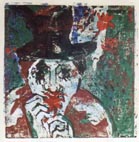 |
| |
|
Pantomime
Hartfaserdruck, 1975, 31,7 x 31,5 cm
»
Galerie |
|
|
|
| |
|
|
fff |
Studying
as a master student at the Academy of Arts in Berlin allowed
Sigrid Noack to work freely to a large extent and left enough
leeway for diverse artistic experiments. A trip to Georgia,
USSR had a liberating effect regarding the colourfulness of
her work. Figure and group composition determined her artistic
work during this period. |
|
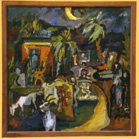 |
|
| |
|
|
|
|
|
|
Exotischer
Friedhof
Öl, 1981, 100 x 100 cm |
|
|
|
|
|
|
|
|
| |
|
A
trip to Yemen in 1983 lasting several weeks marks a caesura
in Sigrid Noack’s work. The foreign and new cultural
circle nurtured and complied with Sigrid Noack’s already
existing appreciation for decoration, ornament and vibrant
colour. Her paintings became carpet-like, lavish and expressive. |
fff |
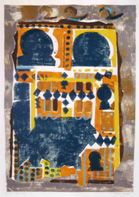 |
|
| |
|
| |
|
|
Haremserker
Farbhochdruck, 1987; 87,5 x 61 cm
»
Galerie
|
|
|
|
| |
|
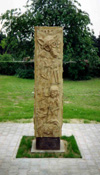 |
fff |
Since
1982 Sigrid Noack has also engaged in small sculptures and
ceramics. In all these years much of her ensuing work uses
various techniques in the field of structure-related art:
casein painting, verre églomisé painting, stained-glass
windows, mosaics, ceramics and steel murals. |
| |
| |
|
| |
Märchensäule
Guben,
Kinderheim, 1992
» Galerie
|
|
| |
|
Sigrid
Noack work became abstract at the end of the 70s and since
1988 her work has been mainly non-representational with the
over-painting of posters and printed graphics ensuing.
Turmoil and disharmony mark her work after The Fall of the
Wall with turbulence and insecurity of the new situation prevailing.
At the same time, however, she paints meditative, figurative
pictures.
|
fff |
|
|
|
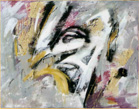 |
| |
|
|
|
|
|
|
|
|
| Grauer
Traum
Collage, Kasein, Spray auf Leinwand, 1991
100,5 x 130 cm
» Galerie
|
|
|
|
|
| |
|
In
August 1991 Sigrid Noack was awarded a scholarship from the
Federal State of Brandenburg which allowed her to participate
in Progetto Civitella d’Agliano. The polyptychon “Zeitenzeichen”
resulting from this period reflects the events in former East
Germany after Reunification. Sigrid Noack met the Potsdamer
composer Michael Schenk in Civitella d’Agliano and ever
since they have been working together realising various projects. |
| |
 |
|
Zeitenzeichen
Revolution, Chaos, Enttäuschung, Ausblick
Polyptychon
(Kasein auf Leinwand), 1991
je 130 x 100 cm |
|
|
| |
|
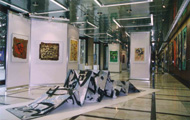 |
fff |
Since
1989 Sigrid Noack’s Artist’s Books have gained
considerable significance and she has produced over 40 of
them not only as single books but also some in small editions. |
| |
|
|
|
Kaskade
Wellkarton, Spiegelfolie, Kasein, 1996 |
|
| |
|
Multimedia
projects with the composers Bert Handrick (Dresden) and Michael
Schenk (Potsdam) as well as the authors Ingeborg Arlt (Brandenburg)
and Klaus-Dieter Brunotte (Hannover) have been very successful. |
| |
|
From
1994 to 1999 Sigrid Noack developed a cycle of about 30
loose leaves on “Gaunerzinker” (Rogues’
Secret Signs) These were exhibited, for example, in the
Konrad-Adenauer- Foundation in Berlin and were acquired
by the Federal Bank NORD/LB Hannover for their art collection.
|
|
|
|
| fff |
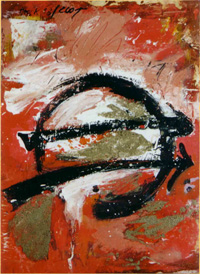 |
|
| |
|
| |
|
|
|
| |
"Bewohner
sind uns feindlich"
Kasein auf Hartfaser, 1998/2001
54,2 x 40 cm
» Galerie
|
|
|
|
| |
|
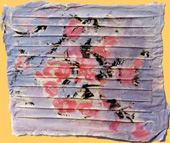 |
fff |
| |
|
|
1997/98
saw the appearance of a work group of loose leaves “Paintings
from Japan" on “Nihon no E” to the music
of Bert Handrick.
1998 Work Group “Schattenschrift” (Shadow Script)
based on the texts of Klaus-Dieter Brunotte.
2000 continuation of the Artist’s Books with “Nebelstreif”
(Streak of Mist) on the 250th anniversary of Corona Schröter’s
death.
|
| |
|
|
|
|
|
Kirschblüten
Kasein auf Japanjalousie, 11.6.1997
51,5 x 62 cm
» Galerie |
|
| |
|
Between
1995 and 2000 Sigrid Noack worked on the group “Schilde”
(Shields). Large-sized work on paper collages on bamboo rods
and tissue paper. The title refers to its military origins
– they defend and shield. In addition Sigrid Noack produced
a graphic cycle on Goethe’s “The Sorrows of Young
Werther”. With her artistic interpretation she enhances
Goethe’s literature of perception with her expressive
paintings of perception. |
fff |
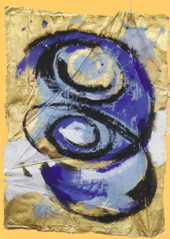 |
|
| |
|
Goldener
Schild mit rotierenden Ornamenten
Kasein, Krepp-Papier, Seidenpapier, Bambusruten,
17.8.1999, 88,5 x 66 cm
» Galerie
|
|
|
| |
|
|
fff |
|
Inspired
by trips through Italy and to Rome in particular, Sigrid Noack’s
attention then turned to Mediterranean culture and is expressed
in work on paper depicting mythology and ancient sites. During
this period she painted numerous loose leaves on Pompeii which
were exhibited in the Winckelmann Museum in Stendal. |
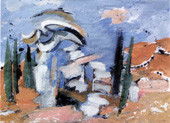 |
|
| |
|
|
|
|
|
|
|
|
|
|
Antiker
Ort
Kasein auf Papier, 16.6.2003, 70 x 97 cm
» Galerie
|
|
| |
|
From
1999 to 2002 a succession of 20 shields “Geld-Dämonen”
(Money Demons) also ensued as a result of the introduction
of the new Euro currency. |
fff |
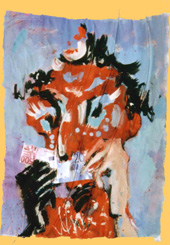 |
| |
| |
|
|
| |
Schnüffelnder
Dämon
Collage, Kasein, Kreide, Bambusruten,
Seidenpapier auf Karton, 12.7.2000
86,5 x 61,5 cm
» Galerie
|
|
|
| |
|
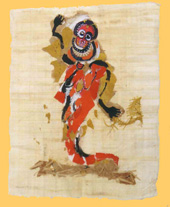 |
fff |
Since
then Sigrid Noack has been preoccupied with various culture
circles and their specific artistic means of expression and
form. 20 loose leaves as an adaptation of Ethiopian talismans
was the outcome of studying Ethiopian Art and the influence
of the highly expressive peoples of Oceania can also be found
in her recent work. Sigrid Noack incorporates natural materials
on natural fibre paper lending her work a new quality. |
| |
|
|
|
Schuppen-Talisman
Stroh, Netz, Kasein, Collage auf Papyrus, 29. 5. 2001, 71 x
56 cm
» Galerie
|
|
|
|
|
|
|
|












